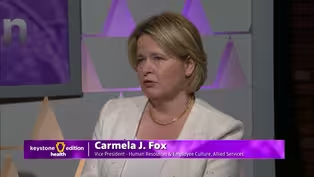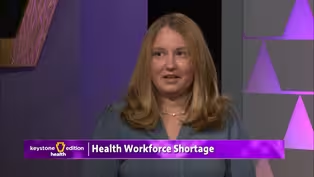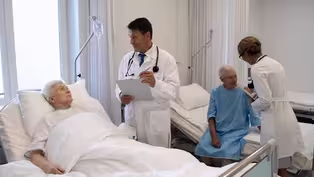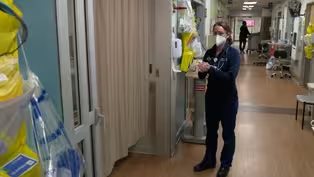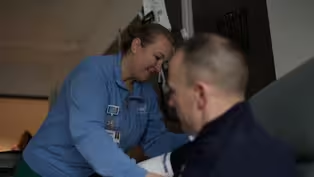Keystone Edition
Health Workforce Shortage
1/20/2025 | 27m 9sVideo has Closed Captions
We'll take a closer look at the healthcare workforce shortage
The healthcare sector faces a critical workforce shortage with a lack of qualified professionals, such as doctors, nurses, and support staff. This shortage is driven by factors like an aging population, increased healthcare needs, burnout, and insufficient training programs.
Problems playing video? | Closed Captioning Feedback
Problems playing video? | Closed Captioning Feedback
Keystone Edition is a local public television program presented by WVIA
Keystone Edition
Health Workforce Shortage
1/20/2025 | 27m 9sVideo has Closed Captions
The healthcare sector faces a critical workforce shortage with a lack of qualified professionals, such as doctors, nurses, and support staff. This shortage is driven by factors like an aging population, increased healthcare needs, burnout, and insufficient training programs.
Problems playing video? | Closed Captioning Feedback
How to Watch Keystone Edition
Keystone Edition is available to stream on pbs.org and the free PBS App, available on iPhone, Apple TV, Android TV, Android smartphones, Amazon Fire TV, Amazon Fire Tablet, Roku, Samsung Smart TV, and Vizio.
Providing Support for PBS.org
Learn Moreabout PBS online sponsorship- [Presenter] Live from your public media studios, WVIA presents "Keystone Edition Health", a public affairs program that goes beyond the headlines to address issues in Northeastern and Central Pennsylvania.
This is "Keystone Edition Health."
And now, moderator Tonyehn Verkitus.
- Good evening and welcome to "Keystone Edition Health."
I'm Tonyehn Verkitus.
Thank you for joining us tonight.
From doctors and nurses to support staff and specialists, the healthcare workforce in Northeastern and Central Pennsylvania is under immense pressure.
And the gap between demand and supply is widening, threatening not just the quality of care, but the very sustainability of our healthcare systems.
This shortage not only affects the quality of care patients receives, but also puts enormous strain on the professionals who are working tirelessly to meet the demand.
As this issue continues to rise, we simply don't have enough people to fill these critical roles.
Why is this happening?
And more importantly, what can we do about it?
But first, WVIA's Lydia McFarlane has more.
(logo whooshing) - [Lydia] Challenging healthcare systems and impacting patient care, health workforce shortages are a global issue due to burnout of high workloads, stress, and inadequate compensation.
Factors contributing to the shortage include an aging population requiring more care, increasing rates of chronic diseases, and a limited pipeline of new healthcare professionals.
According to Duquesne University School of Nursing, the American Association of Medical Colleges or AAMC predicts a shortage of as many as 122,000 physicians by 2032.
The report that made this dire prediction also pointed out that the over 65 population will grow by 48% by 2032.
Unfortunately, many working physicians will also be reaching retirement age along with the rest of the baby boomers.
Addressing the health workforce shortage requires comprehensive solutions such as improving working conditions, expanding training programs, utilizing technology to enhance efficiency, and developing policies that support healthcare workers in both urban and rural settings.
For WVIA News, I'm Lydia McFarland.
- Joining us tonight, we have Jill Avery-Stoss, President of The Institute, Don Seiple, President of St. Luke's Monroe Campus, and Carmela J.
Fox, Vice President, Human Resources and Employee Culture with Allied Services.
Thank you all for joining us.
- Yeah, thanks for having us.
- Thank you.
- Thank you.
- Well, obviously, this is a topic that we hear about pretty often.
I feel like we've even touched on it a little bit on this show.
But it seems to be a problem that just continues as opposed to abating.
So, hopefully you'll have some good news for us tonight.
Carmela, I'd like you to talk a little bit about your role at Allied Services.
I love that your title also has Culture in it.
Can you tell us why that is?
- Yes, thank you very much, first of all, for letting us join you tonight.
And we just created this role, Employee Culture, to try to create an attractive workforce where people feel good about coming to work each day.
We've always done that, but just not formally.
And putting that formal plan into place, we are throughout 55 locations throughout Northeast and Central Pennsylvania.
So, we need a formal plan to make sure that wherever you go within the Allied system, that you feel that same welcoming experience as an employee that our patients and residents feel when they visit our system.
- Don, you also spoke a little bit about culture when we talked this week.
Can you talk about how you're developing your culture as well?
- You know, culture is something we've developed over many years, and it is something that has helped us with retention, recruitment, and intention.
We do regular employee engagement surveys and we score in the top decile.
And when you talk about shortages, one of the most important things is retention.
So, as you recruit individuals, you wanna retain them also.
And so, we feel that our culture's a big piece of our recruitment strategy that we have.
More and more applicants are asking about work environment and culture.
- Yeah, it does seem to be something that people talk about regularly.
I think about 10 years ago probably wasn't as prominent a thing that people looked for at work.
I know that The Institute has done some research around healthcare shortages here in this area.
What sorts of things did they see?
And was culture per chance one of the things that people were looking for?
- Culture is very important, especially considering the rising rates of burnout, difficulty depending on the occupation.
There is some difficulty when we think about wages and reimbursement rates for certain healthcare workers.
They don't always get the livable type of income that they need.
And so, in order to keep them in place and to help retain them, it's really important to make sure that they're satisfied and that they're rewarded and valued in other ways as well.
- Yeah, I'm glad you brought up burnout actually, because we know that physicians face a lot of burnout.
So do nurses.
Clearly, COVID did not help the situation.
Don, are there any programs that you have in place at St. Luke's that helps with burnout?
- Yeah, we have a lot of things that we do around supporting our staff.
You know, certainly during COVID, we had to really increase that in the patient care setting.
Whether it was safe spaces people could go to and just take a break.
Or having somebody that they could talk to.
But yes, both on the physician side and the employee side, we do have a lot of support for our team members.
And you know, I think actually having good staffing is a good piece of that 'cause you talk about burnout and that, and I know we're gonna talk more about it, but we've made a lot of strides in that as well.
But yes, we give a lot of thought to how we can support our team members.
On our campus, we have a walking trail.
And so, we see a lot of people when the weather's nice, just getting out and taking a walk outside on their breaks and stuff.
- That's lovely.
Let's go back a little.
Let's talk about entry level healthcare professionals because I know that's a very different thing that's happening for them than for physicians or specialty physicians.
Can you tell us a little bit about how you're supporting entry level healthcare professionals and what some of their special needs are?
- The biggest thing that we do is try to change the dynamic from a job to more of a career.
And even though you're coming in entry level, we try to provide a lot of opportunity within our system for people to advance their career and develop a path.
So, it gives 'em a goal to work towards.
So for example, we have partnerships in place with Lackawanna College and they can get free tuition working at Allied Services while going to school, and we flex the schedules for them to help accommodate them to attend school.
And it's fully funded so it gives 'em a path.
We have 2,700 employees within our system, several hundred jobs.
So, there is a path for most people if they wanna stay within the system.
We also partnership with career technology in Lackawanna County for our Licensed Practical Nurse Program.
And we have partnerships, a new partnership actually we're excited about with University of Scranton for graduate programs for reduced tuition.
So those partnerships are a great value to us and we use that to help support our staff and give 'em a path.
We also fund Student Loan Repayment Programs and tuition assistance, so there's opportunities.
And even if somebody doesn't want an opportunity, we still wanna make it a great place to work and a welcoming environment.
Some people they maybe don't wanna have that career path, that's fine.
We have opportunities in those entry level positions like food service workers and direct care support professionals that maybe don't wanna go on, but those are such valued positions as well.
So, if people have a compassion for doing that type of work, that opportunity is very fulfilling.
- Don, I know you have some similar programs and you might even have some stories about people who have gone through these programs.
- Yeah.
- Can you share those, please?
- Yeah, very much like Allied is doing, we have a lot of programs to support our workforce, and it also benefits us as an organization because many of those folks grow into roles that we have needs, nursing as an example.
And when you and I were speaking, I talked about, you know, even like in our, a lot of our entry service level jobs, nutrition and those, we have employees who take advantage of the opportunities we have to go to nursing school.
And I think I was sharing with you, we had one employee who, young man outta high school and he was thinking about nursing, but we had this opportunity for on-the-job-training to become a sleep lab tech.
And he took advantage of that and he's almost done with his training and he'll be a certified sleep tech performing studies for us.
And so, and there's, we have like many organizations, we have many positive stories of employees who have come to us and taken advantage of the opportunities that we've presented for them, and it's really rewarding when you see that happening.
- Jill at The Institute, how are you all working with the community in healthcare systems to address the shortage and come up with solutions?
- Well, we are very much behind the scenes.
We are not healthcare practitioners by any means, but we are available to provide data analytics, community-based research services.
So for example, that might look like a community health needs assessment for a healthcare provider where we can help them identify gaps within their communities where there's particular need or high priority.
We can also help them identify strengths that they can capitalize on.
We also have a health and healthcare task force, which is comprised of some volunteer subject matter experts who help us identify study areas.
And we produce research annually, a cycle each year.
This year we are looking at the pipeline for mental healthcare and behavioral healthcare workers.
We also, actually many of our organizations in the community are fortunate enough to be working with the Philadelphia Federal Reserve Bank right now as well for their Anchors For Equity Initiative.
The result of that will be an an equitable workforce development pipeline within the anchor institutions in the region.
And those anchor institutions are education and healthcare.
So, there's a lot of good move forward momentum.
- Right, and when do we expect that the behavioral health report will be out?
- That will be out in May.
- Okay.
- Yep.
- Well, I guess, we'll look forward to that.
- Stay tuned.
- I know that there's been a shortage there too.
- Yes.
- So hopefully, we will have seen some improvement.
And actually, that's something I'd like to hear from any of you that would like to respond.
Have we seen improvement in the shortage?
I would still like to talk more about what you're doing, but do you see these things working?
Would you like to?
- Yeah, I would certainly comment that the answer is yes.
We've seen a lot of improvements.
You know, during COVID, I think, a lot of us were challenged with staffing for various reasons, but there has been a significant improvement in our recruitment and retention, and our reliance on things like agency or, you know?
And so, yes, absolutely.
There's been a significant improvement.
A lot of the initiatives that we've implemented are working for us.
- And I know that you also have an Employee Growth Program.
Can you talk a little bit about that too?
- Yeah, we have a career website for our employees that they can go to and a lot of it's self-guided, but it provides them with assessments and mentorship and helps them write a resume.
So, when they're interviewing for jobs within our network, they have a good resume, there's different modules they can take.
And so, some of these students wanna go on and go to college and advance, but not all of them.
Some of them, they just wanna develop their skills and become better at what they do.
Whether it's a position that requires an education or not, it just helps them be better at what they do and provides some of that fulfillment and development.
And so, it's a really neat tool that we have for them.
- And you spoke a little bit about this too, right?
That folks may not necessarily want to go up the ladder, but how do we keep them feeling comfortable where they are?
And I think a lot of times there's certain hurdles that people have that oftentimes reflect social determinants of health, for instance.
What types of programs are you providing to help with those types of curves?
- So yes, we definitely wanna make sure that people do have access to resources.
So, we do provide resource lists.
We provide career counseling, we provide all kinds of community resource connections for people.
If we have employees who are experiencing hardships, we work with them to try to overcome what's going on in their life on an individual case by case basis 'cause it does exist.
And it does become a challenge, you know?
Things like daycare and figuring out how to even get to work and the bus schedule, for some of our workers poses real challenges.
So, we do work with them to try to find opportunities, to work on finding ride sharing opportunities.
But yes, definitely a challenge.
And I agree, we've had more success in the last year or two with our recruitment numbers have gone up, but they're not where we need them to be to be able to increase our census in our facilities.
I mean, the end result is that when you don't have enough staff, you gotta stop taking admissions based on your staffing and your staffing ratio.
So, it does limit the resources to the community.
Why this is such an important topic to try to attract more people into this occupation.
If it's something you have a passion for, we try to limit the financial deterrence from somebody advancing their education.
And a lot of people still go the traditional route through college, but if you get into a system and you work your way up, some of our best nurses, for example, are those who started as a certified nurse aide and they know what those people are dealing with.
So when they work together as a team, they're not coming in straight outta school into a registered nurse position without having that background and that knowledge.
So, I think it helps the whole environment when you have those ladders in your own organization.
So, that's been a real resource for us.
- Yeah, I read a statistic that said that there are nursing, people who are interested in nursing who are qualified students who can't even go to school because there's not enough people to teach in the schools either, which just sounds mind-boggling to me.
- It is a limiting factor when you talk to educators.
There's two limiting factors.
One is faculty.
And so, having enough faculty to teach, and then also do the clinicals in the hospitals.
I know we try to work with some of our nurses to provide them the opportunity to both do bedside but also do clinical instruction 'cause it benefits us as well.
So that's a big challenge for them.
And then, finding enough clinical sites sometimes for them is difficult as well, you know?
So, they're not always constrained by their own constraints, but by where they can place students for clinical rotations.
- Yeah, let's talk a little bit about education actually.
Do you believe that the med school being here has helped the healthcare shortage?
I mean, I know there's a lot of people that come from outside the area.
Of course, there's local students, but we have a problem getting people to come back after residency.
What have you seen at The Institute trend-wise?
- The medical school is very helpful.
I think actually though from a broader perspective, we have such a robust network of educational institutions and the medical school is absolutely one of them.
We also have residency programs and nursing and pharmacy, and OT and PT, and all of these other wonderful programs.
There's plenty of learning to be had.
So, that's absolutely an asset.
- Recently, WVIA's Alexander Monelli sat down with our panel's own Don Seiple to discuss how St Luke's is being affected by the overall healthcare shortage and what actions are being done to combat it.
- The healthcare industry for probably the past decade has really been preparing for a shortage in workers.
So, what we're seeing is that the baby boomers are becoming of age, they're retiring.
The baby boomers that are retiring have a lot of knowledge and skill and the workforce that's backfilling them are less experienced.
And so, not only do we have a void of a workforce, but they're also the largest generation that we've seen coming of age and needing care as well.
So, some of the consequences a healthcare work shortage can create is longer wait times to see a physician.
You might be scheduled to see an advanced practitioner instead of a physician first to screen you.
In some markets it could mean that there's certain levels of care that aren't available and you have to travel further to get that type of care, more specialized care.
So, what we've seen at St. Luke's relative to healthcare worker shortages, that it certainly got exasperated during the pandemic, although we've been preparing for probably 10 years now.
I would say that we're in a really good place.
We have a lot of initiatives and a great culture that have really helped us to minimize the effects of the healthcare worker shortage.
Some of the initiatives that we've embarked on proactively are, we started a School of Medicine in conjunction with Temple Medical School Programs, with schools, high schools that get students involved with healthcare early.
And we have a lot of internal programs and mentorship programs for our employees.
Work culture's important for retention.
So, having a supportive culture that allows them to go to school, maintain their work, and achieve their goals.
- I'd like to go back to the topic of education.
You just talked a little bit about the Temple Program.
Can you flush that out a little bit more for us?
- Yeah, so we consider ourselves a university health network and we have a number of different things, but we did start a med school many years ago in conjunction with Temple.
And again, this kind of goes back to seeing that the shortage that was gonna be occurring in physician staffing that many of the professional organizations were projecting.
And so, we now have a four-year med school on campus.
Many of our students are regionally from like Eastern Pennsylvania and New York and New Jersey.
'Cause it's shown that many people where they train, they tend to come back then and practice.
And so, now we're starting to finally see the fruits of that where we have medical students who have gone through residency and maybe fellowship, and are now coming back and practicing with us.
And so, I think it's been a great tool for us to not only educate but help fulfill some of our own needs in physician staffing.
- You talked about some of the programs before, and one of the things that I think is very lovely about our area, a lot of people don't wanna come back, but I've met residents who are from larger cities and they choose to stay here because of the cost of living, because of the proximity to other cities.
Have you found that people who maybe come from out of town, like to stay in the area once they're here between your programs?
- I think that generally yes, but there are a lot of challenges kind of in the periphery that need to be addressed to really maximize that desire to live and work here, housing for example.
I'm so glad Carmela that you mentioned the childcare and transportation challenges because there's all of them.
I mean, healthcare workers are not typically 9:00 to 5:00 workers.
And so, getting the bus each day isn't necessarily a very straightforward issue, or finding daycare that's after hours, or overnights or around the holidays.
It's just not feasible.
So, there's all of these other things that we can do throughout the region that I think can make it much more palatable for people to come and work here in the healthcare workforce.
- We also heard about demographics from you, Don.
Also in the introduction.
Can we talk a little bit about how the demographics are changing?
I don't know if you would like to speak to that, Carmela.
- So, we have baby boomers who actually, a little different than you, that have come back to work after, they retired during COVID, they came back to work and they are some of our great mentors for new students coming out of the workforce.
So, we haven't had that major shift in the demographics that other areas have had, but we still, we have a huge population of behavioral health workers and you were speaking to your survey.
I'm excited to see that.
We actually are in partnership, we're actually fortunate to be funded by Northeast Pennsylvania Healthcare Foundation funding to help advance the Careers Retention Recruitment of the Behavioral Health staff.
So, we really are looking to attract them to this area, and that again, poses some challenges, but that's one avenue for that demographic.
- I'm glad you mentioned that funding.
I happened to be on their board, so I was very excited to see- - That's excellent.
- That they were doing that.
I also think some of the work that they've done around funding nurses in this area, because there are folks who've been funded multiple times, so it's helped progress their career.
And again, it helps with transportation and some of these other issues.
Talking about nursing, I'd like to talk about your nursing program because it's the oldest in the country.
- Yeah, it's the oldest continuous running nursing program in the country, 140 years.
And as we were talking about the other day, it was the fourth one created in the country and now the longest running.
And you know, what I would say is we do partner with a lot of local nursing programs as well.
Given the size of our organization, no one program can really provide all the needs that we have, but we are fortunate to have our own nursing school, and large majority of our students are our employees that attend those programs.
We've expanded our classes, we've given different options.
Weekend options, night options, depending on... And within the last year or two, our student body is more non-traditional than traditional where it used to be a more of a traditional nursing population.
And I think you see that in a lot of the, especially a lot of the community colleges today.
They have a large population of non-traditional students.
But it's been a really good feeder for us over the years, and we continue to look at how we can educate.
I think I shared with you, we're starting our own College of Health Sciences now to start to produce or educate, I should say, respiratory therapists and X-ray technicians and RNs to BSN.
And we hope to grow that in the future.
- I think we should also just touch on very briefly, getting kids who are still in high school interested in these fields.
Are any of you doing programs that enrich existing high school programs or vo-tech programs?
- Yeah, I'd be glad to talk about that.
We've done a lot of work with high school students and they can be everything from attending career fairs to, we have two programs in particular that we're doing today that I feel are, have been really beneficial.
One is through a local school and Careerlink, we got some funding, and we do a career linking academy.
And so, part of that is they come to the school or to the hospital, and they get to experience different careers while they're there.
We also do some education at the school and they also go to the Community College as well.
And those students generally are aspirational to becoming, like, getting undergraduate degrees and going on to medical school and those sorts of things.
Most of them come from underserved families as well.
So, it's a great opportunity.
And then secondly, we work with our local vocational technical school who has a healthcare program.
And the juniors and seniors that come to our hospital and do a clinical every week, they're there a couple days a week.
They're in a modified Patient Care Assistant role.
They wear a uniform and a badge and it's been excellent.
Last year, we hired 20 of them when they graduated high school to fulfill needs that we have, and over half of them accepted nursing scholarships and they're now getting nursing.
- That's amazing.
I'm so glad to hear- - Yeah.
- That we're supporting people from high school up to non-traditional students, and that you've all developed programs or thinking about programs that can help improve the shortage that's happening here in our area.
Thank you to all of our guests for their insights and to all of you for joining us.
This and every episode of "Keystone Edition" is available on demand on our YouTube channel.
And now it's a special audio podcast, so you'll never miss an episode.
Visit wvia.org/keystoneeditionhealth to stream episodes or subscribe to the podcast.
For "Keystone Edition Health", I'm Tonyehn Verkitus.
Have a good evening.
(light upbeat music)
Building Careers and Breaking Barriers
Video has Closed Captions
Clip: 1/20/2025 | 14m | Experts suggest solutions to the healthcare workforce shortage, highlighting strategies (14m)
Video has Closed Captions
Clip: 1/20/2025 | 7m 17s | Programs engage high school students through career fairs, clinical roles, and scholarships, (7m 17s)
Health Workforce Shortage - Overview
Clip: 1/20/2025 | 1m 11s | Health Workforce Shortage - Overview (1m 11s)
Health Workforce Shortage - Preview
Preview: 1/20/2025 | 30s | Watch Monday, January 20th at 7pm on WVIA TV (30s)
St. Luke's Tackles Healthcare Worker Shortage
Clip: 1/20/2025 | 1m 59s | St. Luke's President Don Seiple discusses the healthcare worker shortage, (1m 59s)
Providing Support for PBS.org
Learn Moreabout PBS online sponsorship
- News and Public Affairs

Top journalists deliver compelling original analysis of the hour's headlines.

- News and Public Affairs

FRONTLINE is investigative journalism that questions, explains and changes our world.












Support for PBS provided by:
Keystone Edition is a local public television program presented by WVIA
